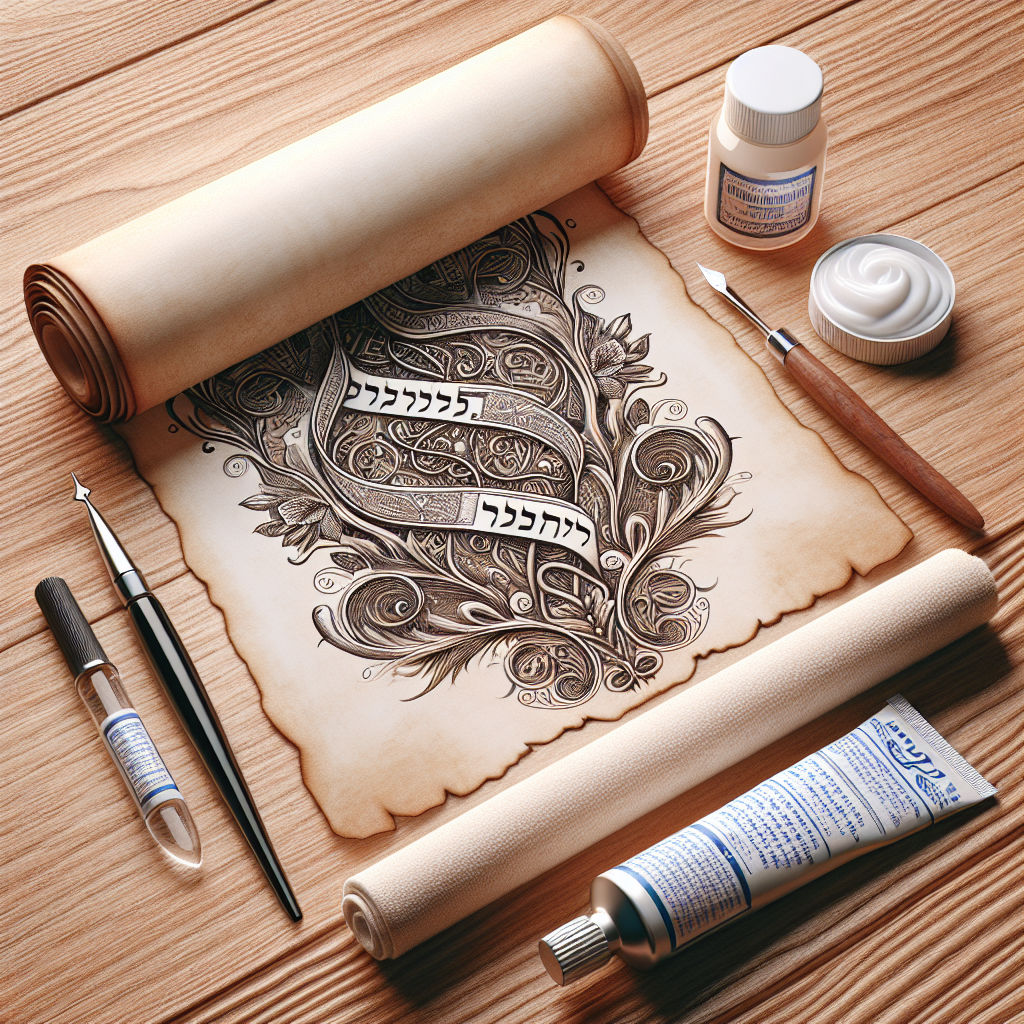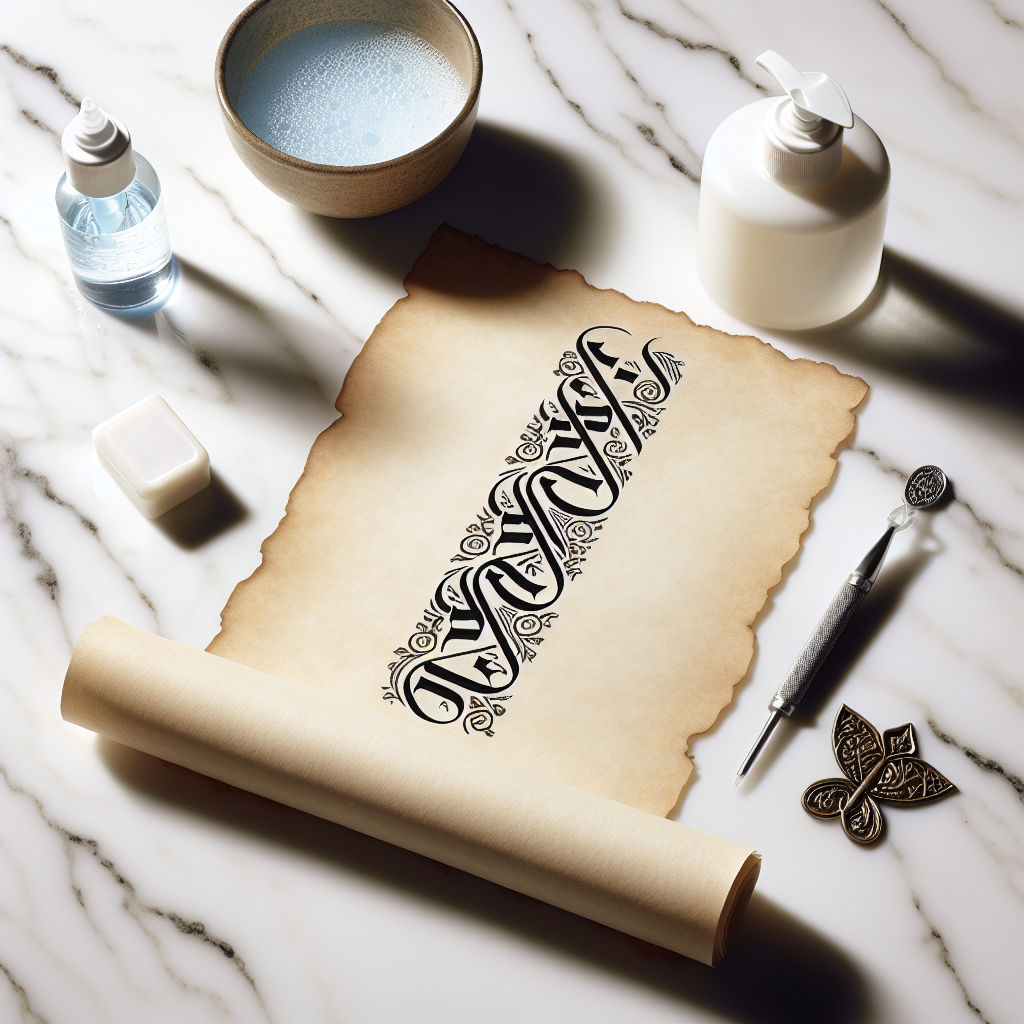“Guide to Caring for Your Hebrew Script Tattoo”
Introduction to Hebrew Script Tattoos
Tattoos have long been a form of self-expression, a way to commemorate significant events, or to pay homage to loved ones. Among the myriad of designs and scripts used, Hebrew script tattoos stand out for their profound cultural and personal significance. The ancient language, with its distinctive characters, carries a historical weight and spiritual depth that resonates with many individuals, both within and outside the Jewish community.
The allure of Hebrew tattoos lies in their enigmatic beauty and the sense of mystery they evoke. Each letter in the Hebrew alphabet has its own intrinsic meaning and numerical value, which can add layers of interpretation to the tattoo. For some, a Hebrew script tattoo is a connection to their Jewish heritage, a sacred text, or a personal reminder of spiritual beliefs. For others, it may represent an appreciation for the language’s aesthetics or a connection to the land of Israel.
However, it is crucial to approach Hebrew script tattoos with sensitivity and respect. The Hebrew language is intrinsic to Jewish culture and religion, and certain phrases or names, particularly those of a religious nature, carry significant weight. It is essential to understand the meaning and context of the words chosen for a tattoo to avoid cultural appropriation or disrespect.
Moreover, tattoos in Hebrew script require unique considerations for care, given the precision of the characters and the importance of maintaining their legibility. The aftercare process is vital to ensure that the tattoo heals correctly and the script remains clear and sharp.
Understanding the Healing Process
The healing process of a tattoo is a critical phase that determines the final appearance and longevity of the design. For Hebrew script tattoos, the clarity of the fine lines and intricate details is paramount, making the healing process even more significant.
The healing typically occurs in stages. The first stage begins immediately after the tattooing process, where the skin will likely be red, swollen, and tender. This is when the body starts to heal the puncture wounds from the tattoo needle. During the first few days, the tattoo will secrete a mixture of blood and ink, which is entirely normal.
The second stage involves the peeling of the skin, which usually occurs within the first week. As the skin regenerates, it will shed the outer layer, and it may be tempting to pick at the peeling skin or scratch the area. However, it is crucial to let the skin peel naturally to avoid damaging the tattoo.
The final stage is the deeper healing of the skin, which can take several weeks. During this time, the tattoo may appear fully healed on the surface, but the layers of skin beneath continue to repair. The ink settles into the skin, and the tattoo’s appearance becomes more defined.
The expected timeline for a Hebrew script tattoo to heal can vary from person to person, but generally, it takes about two to three weeks for the outer layers of skin to heal and up to six months for the tattoo to completely settle into the skin.
Immediate Aftercare Procedures
Proper aftercare is essential for the healing and longevity of a Hebrew script tattoo. Immediately after the tattooing process, the artist will clean the area and apply a thin layer of ointment before wrapping it in a protective bandage. This bandage should be left on for a few hours to prevent bacteria from entering the wounds.
Once the bandage is removed, the tattoo should be gently washed with lukewarm water and a mild, fragrance-free soap to remove any excess blood or ink. It is important to pat the area dry with a clean paper towel and not to rub it, as this can irritate the skin.
Keeping the tattoo clean and protected is a continuous process. The tattoo should be washed a few times a day, and a thin layer of aftercare ointment or lotion should be applied to keep the area moist and promote healing. It is essential to use products specifically designed for tattoo aftercare or those recommended by the tattoo artist.
The tattoo should be kept out of direct sunlight and not submerged in water, such as in a pool or bathtub, during the initial healing period. Clothing that covers the tattoo should be loose and made of a breathable fabric to prevent irritation and allow the skin to heal.
In conclusion, Hebrew script tattoos are a beautiful and meaningful way to express one’s identity, beliefs, or appreciation for the Hebrew language. However, they require a commitment to proper aftercare to ensure that the script remains clear and the tattoo heals correctly. By understanding the healing process and following immediate aftercare procedures, individuals can enjoy their Hebrew script tattoos for years to come, with the characters as crisp and meaningful as the day they were inked.

Choosing the Right Aftercare Products for Hebrew Script Tattoos
The journey of tattoo aftercare is pivotal in ensuring the longevity and vibrancy of your Hebrew script tattoo. The intricate lines and strokes that form the ancient letters require meticulous attention, and the products you choose for aftercare play a significant role in the healing process. It is essential to select ointments and lotions that not only promote healing but also preserve the integrity of the delicate script.
When it comes to ointments, the primary goal is to keep the tattooed area moist and to aid in the healing of the skin. Products containing ingredients such as petrolatum or lanolin can be beneficial during the first few days post-inking. These ingredients create a protective barrier that locks in moisture and keeps out bacteria. However, it is crucial to use them sparingly, as excessive application can clog pores and lead to skin irritation.
As the tattoo begins to heal, the focus shifts to keeping the skin hydrated. Lotions that are fragrance-free and hypoallergenic are recommended to minimize the risk of allergic reactions. Look for lotions containing essential vitamins like Vitamin E and Vitamin C, which are known for their skin-healing properties. These vitamins can help to repair the skin and enhance the natural healing process.
It is equally important to discuss the ingredients to avoid in aftercare products. Alcohol, for instance, should be avoided as it can dry out the skin and cause the tattoo to fade. Similarly, products with artificial fragrances or colorants can irritate the skin and should be sidestepped. Parabens, which are used as preservatives in many cosmetic products, can also be harmful to sensitive skin and are best avoided.
In summary, the right aftercare products for a Hebrew script tattoo should be gentle, nourishing, and free of harsh chemicals. By choosing wisely, you can ensure that your tattoo heals properly and maintains its beauty for years to come.
Protecting Your Tattoo from Infection and Ensuring Long-Term Care
The risk of infection is a concern that cannot be overlooked in the realm of tattoo aftercare. An infection can not only compromise the aesthetic appeal of your Hebrew script tattoo but can also pose serious health risks. Recognizing the signs of infection is critical. Symptoms such as excessive redness, swelling, a sensation of heat in the tattooed area, or the presence of pus are all red flags. If you notice any of these signs, it is imperative to seek medical attention promptly. Early intervention can prevent the infection from worsening and safeguard both your health and the integrity of the tattoo.
To prevent infection, strict hygiene must be maintained. The tattooed area should be cleaned gently but thoroughly with mild, antibacterial soap and warm water. It is essential to pat the area dry with a clean paper towel, as cloth towels can harbor bacteria. Additionally, avoid submerging the tattoo in water, such as in pools or hot tubs, as this can introduce harmful bacteria to the vulnerable skin.
Long-term care for your Hebrew script tattoo extends beyond the initial healing phase. Daily habits play a crucial role in maintaining the vibrancy of the ink. Moisturizing the tattooed area regularly with a fragrance-free lotion can keep the skin supple and prevent the tattoo from becoming dull. It is also vital to protect the tattoo from the sun’s harmful UV rays, which can cause fading over time. Applying a broad-spectrum sunscreen with an SPF of 30 or higher can shield the tattoo from sun damage, preserving its clarity and color.
In addition to moisturizing and sun protection, overall skin health is essential for tattoo maintenance. A balanced diet rich in antioxidants and omega-3 fatty acids can promote skin health from the inside out. Staying well-hydrated by drinking plenty of water can also keep the skin—and your tattoo—looking its best.
In conclusion, the aftercare of a Hebrew script tattoo is a multifaceted process that requires careful selection of products, vigilance against infection, and a commitment to long-term skin care. By adhering to these guidelines, you can ensure that your tattoo remains a vibrant and meaningful expression of your personal story for many years to come.

The Impact of Lifestyle on Tattoo Longevity
The decision to adorn one’s body with a Hebrew script tattoo is not only a testament to personal or cultural significance but also a commitment to preserving the integrity of the artwork. The longevity of a tattoo is not solely dependent on the initial inking process or the immediate aftercare; it is profoundly influenced by the bearer’s lifestyle choices. Diet, hydration, and exercise play pivotal roles in maintaining the vibrancy and clarity of the tattoo over time.
A balanced diet rich in vitamins and minerals is essential for skin health. Nutrients such as vitamin C, E, and A, along with zinc and omega-3 fatty acids, contribute to the skin’s ability to repair itself and fight off potential infections. These nutrients also aid in maintaining skin elasticity, which is crucial for keeping tattoos from fading or distorting. Antioxidant-rich foods can help combat the effects of free radicals, which can damage skin cells and affect the appearance of the tattoo.
Hydration is another cornerstone of tattoo care. The skin, being the largest organ of the body, requires adequate water intake to stay hydrated and supple. When the skin is dehydrated, it becomes dry and flaky, which can lead to premature aging and fading of the tattoo. Drinking plenty of water not only maintains the skin’s moisture balance but also ensures that the detoxification processes that keep the skin clear and vibrant are functioning optimally.
Exercise, while beneficial for overall health, must be approached with caution in the context of tattoo care. Excessive sweating can irritate a new tattoo, and equipment at gyms can be a breeding ground for bacteria that could infect a healing tattoo. Once the tattoo has fully healed, regular exercise can improve circulation, which is beneficial for skin health and can help maintain the vibrancy of the tattoo. However, it is important to protect the tattoo from excessive sun exposure during outdoor activities, as UV rays can cause significant fading.
Professional Touch-Ups and Corrections
Over time, even with meticulous care, tattoos may require professional touch-ups to restore their original luster. This is particularly true for Hebrew script tattoos, where the clarity of the characters is paramount to preserving their meaning and aesthetic. Touch-ups can address issues such as fading, blurring, or color changes that can occur as the skin ages and undergoes changes.
When considering a touch-up, it is crucial to select a professional who is experienced with Hebrew script to ensure that the integrity of the characters is maintained. The artist should have a keen understanding of the script’s intricacies and the cultural significance behind it. A touch-up is not merely a cosmetic fix but a restoration of the tattoo’s essence.
In some cases, corrections may be necessary if the original tattoo was not executed properly or if the design has become distorted due to skin stretching or other changes. Corrections require a skilled hand, as they often involve working around or over the existing tattoo. The artist must be adept at blending the old and new work seamlessly, ensuring that the corrected tattoo maintains its intended appearance and significance.
Understanding Cultural Sensitivity and Respect
The allure of Hebrew script tattoos extends beyond their aesthetic appeal; they often carry deep personal or religious meanings. It is imperative for individuals to understand the meaning of the words or phrases they choose to ink on their bodies. Misinterpretations or misspellings can lead to unintended, sometimes offensive, outcomes. Moreover, given the sacred nature of Hebrew as the language of the Jewish people and its use in religious texts, it is essential to approach such tattoos with the utmost respect and sensitivity.
Before getting a Hebrew script tattoo, one should research thoroughly or consult with someone knowledgeable in the language and culture. This due diligence is a sign of respect for the culture from which the script originates and helps prevent the appropriation of symbols that hold significant religious value.
In addition to understanding the meaning, it is also important to consider the placement of the tattoo. Certain religious or cultural norms may view tattoos on particular body parts as disrespectful. Being mindful of these nuances is part of being a responsible and culturally sensitive individual.
In conclusion, the journey of caring for a Hebrew script tattoo is an ongoing process that extends far beyond the tattoo parlor. It encompasses a lifestyle that supports skin health, professional maintenance when necessary, and a deep respect for the cultural and religious significance of the script. By embracing these aspects, individuals honor not only their personal narratives but also the rich cultural heritage inscribed on their skin.

Understanding Cultural Sensitivity and Respect in Hebrew Script Tattoos
In an era where the art of tattooing transcends borders and cultures, Hebrew script tattoos have emerged as a popular choice for those seeking meaningful body art. However, the decision to etch words from a language that is deeply intertwined with Jewish history and religion should not be taken lightly. This article delves into the importance of cultural sensitivity and respect when it comes to Hebrew script tattoos, offering a reflective analysis on the subject.
Hebrew, an ancient language that has carried through millennia, is not just a means of communication but a vessel of profound cultural and religious significance. It is the language of the Torah, the central reference of the Jewish religion, and holds a sacred status among Jewish communities worldwide. When individuals choose to inscribe Hebrew on their skin, they are, whether intentionally or not, interacting with this rich tapestry of tradition and belief.
The first step in approaching a Hebrew script tattoo with respect is to ensure a clear understanding of the tattoo’s meaning. Misinterpretations and mistranslations are common pitfalls, given the complexity of the language and its script. It is not uncommon to encounter tattoos with misspelled words or phrases that convey unintended messages. Consulting with a native speaker or a scholar of Hebrew language is essential to avoid such errors and to grasp the full context of the chosen inscription.
Moreover, it is crucial to be mindful of the religious connotations that certain Hebrew phrases or symbols may carry. For instance, verses from sacred texts or the name of God in Hebrew are considered holy and are treated with utmost reverence in Jewish tradition. Tattooing such elements can be seen as disrespectful or offensive to those who hold these beliefs. It is always advisable to research and understand the religious implications of a Hebrew phrase before making it a permanent part of one’s body.
Cultural appropriation is another concern that must be addressed. The act of adopting elements from a culture not one’s own, especially without understanding or respecting the original context, can lead to misrepresentation and cultural insensitivity. When non-Jewish individuals get Hebrew tattoos, they should question their motivations and consider whether their choice pays homage to or exploits the culture from which they are borrowing.
Furthermore, the act of tattooing itself is traditionally forbidden in Judaism, based on interpretations of Leviticus 19:28, which admonishes against body markings. While modern perspectives vary, and many Jewish people do get tattoos, it is important to recognize and respect the cultural and religious discussions surrounding this practice.
In light of these considerations, it is evident that getting a Hebrew script tattoo is not merely a fashion statement but a decision that requires thoughtful consideration and respect for the cultural and religious heritage associated with the language. It is a commitment to carry a piece of a culture’s soul, and with it comes the responsibility to honor and uphold the dignity of that culture.
In conclusion, the journey of caring for a Hebrew script tattoo extends beyond the physical aftercare; it encompasses a deeper level of cultural and spiritual mindfulness. As we embrace the beauty and significance of these tattoos, let us do so with an informed and respectful approach, ensuring that our body art is not only aesthetically pleasing but also culturally considerate. By doing so, we pay tribute to the ancient language of Hebrew and the people who have cherished it through the ages, fostering a spirit of understanding and appreciation in the diverse tapestry of human expression.